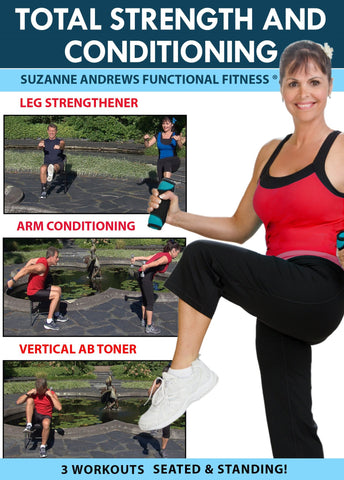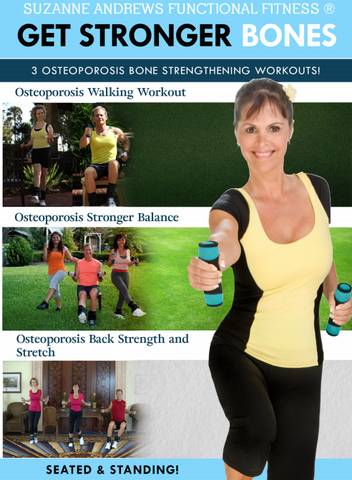by Suzanne Andrews
Has the dreaded "middle age spread" added inches to your waistline? If so, you're not alone. Sedentary jobs and slowing metabolisms cause many middle-aged individuals to gain weight.
It can be discouraging to find that the foods you ate in your youth without a second thought are now making the scale creep higher and higher. But you don't have to take it sitting down! Here are some effective weight loss tips for people over the age of 50.

1. Skip the crash diets.
When you were younger, your hormones did a lot to keep you healthy. After the age of 50, you will need to focus on good nutrition to get the same effect. Avoid starving yourself or limiting your diet too strictly.
You need vitamins and minerals now more than ever. Eat a variety of colorful vegetables, fruits, lean meats, and low-fat dairy products.
Increase your fiber intake to at least 30 grams a day for optimal digestive health. Dehydration can lead to stiff joints, aches and pains, so make sure you're drinking 64 oz of water each day as well.
2. Protect your bones.
Calcium deficiency can lead to a loss of bone density and full-blown osteoporosis. Generally Men and Women over 50 and men require 1,500 mg of calcium daily to stave off the loss of bone density.
IMPORANT TIP: Vitamin D is crucial for calcium absorption. Men over 50 and postmenopausal women require 400-800 i.u. of vitamin D every day. At the age of 65, this requirement increases to 600 - 800 i.u. per day.
3. Combine cardio exercise with strength training.
Cardio exercise will strengthen your heart and lungs and keep your joints supple. Strength training exercises counteract muscle and bone deterioration, and can prevent fractures at vulnerable sites like the wrists and hips.
Ideally, adults over 50 should engage in weight-bearing cardio exercises, such as walking or dancing, for 20 - 30 minutes, 4 - 5 times a week. They should also do strength-training exercises 3 times a week.
The appropriate amount of exercise varies according to each individual's level of wellness and fitness. I find that starting my day with a workout sets me up to stay on course the rest of the day. While it's not' always easy to get up early, the good health results are worth it.
If you've been diagnosed with low bone mass (osteopenia), get your doctor's approval before doing exercises that require you to bend or twist your spine. That's why in the Get Stronger Bones DVD all the exercises are osteoporosis safe and done at the correct speed for building bone density.

4. Take injuries seriously.
Injuries can affect anyone at any age, but older adults need to take steps to ensure that a simple strain doesn't turn into something more serious.
Exercise is an important part of a healthy weight loss routine, so you don't want an injury to keep you on the sidelines. Exercising too is not recommended and it doesn't produce the best results as your working momentum more than muscle!
If you experience acute pain during or after a workout, take a break and assess the injury. A strained muscle might require a few days of rest, massage, gentle stretching, and an anti-inflammatory medicine like ibuprofen.
Sore joints might need rest, anti-inflammatory medicines ad any bone injury should be looked at by a doctor. Also, if you have a disease that decreases your body's healing abilities or weakens your immune system, play it safe and go to your doctor for advice.
5. Get plenty of rest.
Adequate sleep is important for many reasons. It allows your body to rest and renew itself, keeps stress hormones at a minimal level, and helps your muscles and joints
recover after a workout.
While insomnia is a common complaint among older people, it's not a normal part of the aging process.
If you have trouble falling or staying asleep, adding regular exercise to your daily routine can help. Daily exposure to sunlight has also been linked to improved sleep quality.
If you think you might need a sleep aid to help you sleep, try a natural alternative like yoga instead. Yoga is great at helping people sleep better. Sleep aids make people forgetful and groggy the next day.
6. Set realistic goals.
Weight loss is possible for people young and old, but the sad truth is that it might not happen as fast as you'd like once you reach a certain age.
Don't expect a rapid reduction in weight. Instead, set a goal of 1 pound per week. Keep a food and exercise journal to track the number of calories you consume and
burn each day.
If you're doing everything right and still not losing weight, talk to your doctor to find out if underlying health problems or medications could be interfering with your weight loss.
You can stop dieting, start eating and start living with Suzanne Andrews Functional Fitness DVDs!
 Suzanne Andrews founded Functional Fitness in 2008, the most popular fitness series for boomers and seniors broadcasting on over 159 Public Television stations throughout the US and Canada. Read Suzanne’s inspiring comeback story of how she survived a near fatal accident, From Deaths Door to Producing a National Fitness Series. Feel free to send Suzanne a message here.
Suzanne Andrews founded Functional Fitness in 2008, the most popular fitness series for boomers and seniors broadcasting on over 159 Public Television stations throughout the US and Canada. Read Suzanne’s inspiring comeback story of how she survived a near fatal accident, From Deaths Door to Producing a National Fitness Series. Feel free to send Suzanne a message here.














